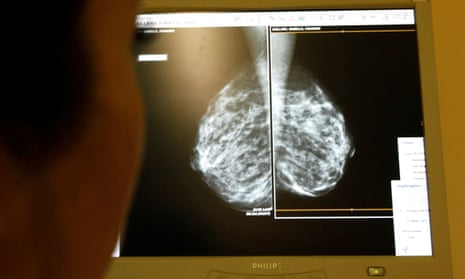Women with advanced breast cancer in England will be able to benefit from a new type of immunotherapy on the NHS after a U-turn by the medicines watchdog.
The National Institute for Health and Care Excellence (Nice) has overturned its draft rejection of Keytruda (pembrolizumab) and said women in England can take the drug in combination with chemotherapy.
The drug can be used by patients with incurable secondary triple negative breast cancer. Its aim is to slow the progression of the disease, buying women “precious” extra time.
Delyth Morgan, the chief executive of Breast Cancer Now, said the move was “absolutely fantastic news” for patients with the disease. Median overall survival is 23 months with the new immunotherapy compared with 16.1 months with chemotherapy alone.
“Following its worrying provisional rejection by Nice earlier this year, the reversal of this decision now brings hope to eligible women for whom it could bring precious additional time before their disease progresses and more months to live and spend time with loved ones and doing what matters most to them,” she said.
Keytruda is used with chemotherapy in women with triple negative breast cancer whose tumours express PD-L1 with a combined positive score greater than or equal to 10. They must also not have had chemotherapy for advanced disease, and they qualify for treatment if surgery is not possible to remove the tumour.
Nice said that after its previous rejection, the manufacturer MSD proposed that the drug combination should be restricted to people whose tumours express PD-L1 with a CPS greater than or equal to 10. This meant Nice was able to look again and pass the drug, which helps the patient’s own immune cells to attack cancer.
Helen Knight, the interim director of medicines evaluation at Nice, said: “I am pleased the company has been able to work constructively with us to find solutions to the issues highlighted in our previous draft guidance. People who were not able to access atezolizumab, another Nice-recommended immunotherapy, now have an important new option that can help them live longer and spend more precious time with their loved ones.
“So, although our recommendation is for a narrower population than pembrolizumab combination is licensed for, it means the maximum number of people with advanced triple negative breast cancer now have access to effective treatments.”
Morgan said she hoped women with advanced breast cancer would soon be able to benefit from more options. “Despite this positive news, we now also desperately need to see progress on the Nice appraisal of Trodelvy, which is another potentially life-extending drug for certain people with secondary breast cancer, that was devastatingly provisionally rejected in April.”
Separately, a poll for Breast Cancer Now of 1,007 women with breast cancer has found 44% said the disease negatively affected their body image and 25% said the same for their sense of identity.
Overall, 37% said their diagnosis worsened their mental health and self-esteem.
